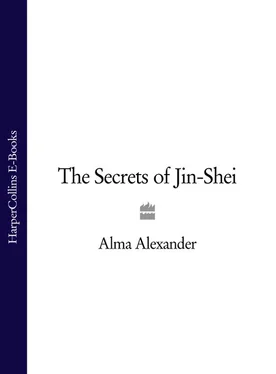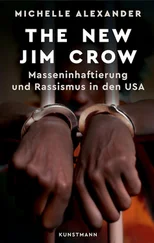Now Khailin wore a small smile as she went in search of the mystery spirit’s shrine. She thought she might have at last – finally – found a use for the ugly little thing. She’d light an incense stick in front of the mystery God, and ask him to help her solve a mystery.
Help her find the crippled girl.
Nhia mulled over her encounter at the Temple as she limped home. It was something she hugged close. She might have told little Tai, the daughter of the widow seamstress who lived a block up from Nhia’s compound, because Tai had a knack for listening and for both making something a big thing and for keeping it in its place at the same time. Tai was young enough to be impressed and old enough to know why she was impressed. But Tai and her mother were at the Summer Palace, helping primp the Imperial ladies for the coming Court, and Nhia was stuck in the sweltering city enduring the season as best she could. She found herself a little surprised to find what a dearth of choices she had for a confidante; with Tai absent, it had narrowed down to …; to herself. Herself and the things that people who gave her their instinctive trust gave her. But that was different – that was her being talked to, instead of doing the talking.
On the way home through the streets that shimmered with heat and swirled with dust-devils in the alleys, she allowed herself a brief bitter moment of self-pity. Would it have been different if she had been able-bodied? Would the miraculous cure of her gimpy foot also bring her a friend or two she could share her dreams with?
The day was far advanced; Nhia had spent too long at the Temple, even by her mother’s admittedly biased measure.
‘You’re late,’ Li said. ‘Did you find what you sought at the Temple?’
She always asked that. As though there could be a different answer than the one she always got. Her tone, however, was a little pointed this time, leaving unspoken the barbed implication that whatever Nhia had been looking for there could have taken considerably less time.
‘Yes, Mother,’ said Nhia, gritting her teeth, coming up with the customary reply to the usual question, choosing not to respond to the undercurrents. ‘The Temple was fulfilling.’
There could have been a different answer this time, but Nhia, for all that she ached to talk about what had happened, shied from discussing it with her mother. There would be too many questions, too many conclusions being jumped to, too much extrapolation and speculation, possibly far too much unwarranted excitement. That was not what she wanted, not right now.
Li, not knowing that there was anything beneath Nhia’s terse and colourless reply, appeared to be content with the response that she had expected, and delved no deeper. She handed Nhia a pile of mending to be done while she got on with folding the washed, starched and ironed linen ready to go back to clients before starting on ironing the next batch. There could have been nothing more calculated to dampen Nhia’s enthusiasm and initial euphoria. This was what she was. This was what she would always be. Daughter to the woman who did the laundry and the mending for the wealthy and the well-to-do. The crippled daughter of the woman who did the laundry. Someone who could help stir the sheets in the vats, her eyes smarting from the sharp bleach her mother used, or mend small tears in fine tablecloths or women’s underwear. It wasn’t even a craft or a thing of beauty, the sort of thing the much younger Tai could already accomplish with her own needle and the silk embroidery thread. Nhia was neat but her hands were not as skilled, nor her mind that way inclined. For her, the needle was neither more nor less than simple drudgery.
Her mother’s two heavy black irons were set to heat on the heating plate laid over raked embers, and Li had already started on the chore of fiercely flattening recalcitrant starched linen sheets which haughty servants would soon be tucking onto patrician beds draped with brocaded hangings. Li ironed with a fixed snarl on her face, as though punishing the sheets for the pleasure stains with which they had arrived in her establishment – for all the laughter, and the whispers, and the joy with which they mocked her own solitary existence. Li was not widowed – there would have been some sort of honour in that, at least, and she could have held her head high just as Tai’s mother, Rimshi, had done for years. It was worse, far worse. After Nhia’s arrival, Li’s husband had hung around only long enough to realize what his life would be like from then on – the desperate piety, the offerings, the talismans, the ganshu readers, the endless pilgrimages to the Temple, the souring, unrewarded faith – and then he had quietly left one day, simply melting away, taking a change of clothes and his yearwood and nothing else at all. The most bitter blow had been when the rumours had reached Li and her abandoned daughter that her errant husband had established residence on the outskirts of Linh-an, and was openly living with another woman with whom he had started another family. With whom he had a chubby, angelic son who was almost three before Li found out about his existence. A perfect child. Already able to toddle. Nearly ready to run.
A living reproach to the woman who had borne the crippled daughter.
For some reason it was the ironing that brought all this out in her. Most of the time Li was ready to blame the cruel Gods and deities for her lot in life – but when she ironed, through a queer chain of associations, it was all Nhia’s fault – Nhia’s fault that she had been born, that her mother had lived for nearly twelve years now without a man to warm her own bed, without the need to wash her own sheets clean of one night’s pleasures and starch them into crisp cleanliness breathlessly awaiting the next. Nhia knew the pattern, if not the actual details behind it; she knew the lines that crept onto her mother’s face, and knew very well just when it was prudent to make herself scarce.
Nhia found it hard to walk for very long or very far, but somehow there was enough strength in the twisted foot to operate her mother’s pedal-powered linen delivery cart, and so that had evolved into her particular chore. Rimshi, with her Court connections, had helped Li get a lot of commissions from households associated with the Court. There was no obligation there, no duty, no jin-shei tie even – but Rimshi had not needed the weight of a jin-shei pledge to offer what help she could. But while summer was Rimshi’s busiest time, preparing the Imperial women for the Autumn Court, summers were always a lean time for Li – simply because the actual Court removed to the Summer Palace and that meant no copious quantities of carelessly soiled laundry from the women’s quarters and no substantial commissions or generous gratuities from those rich enough to be able to afford them without qualms. But there were other households, on the fringes, and it was mostly those to which Nhia pedalled with her cartload on those summer days.
She preferred to do her rounds in the early mornings or in the late, late afternoons when the sun was not beating down with quite as much fury as during the molten, white-hot middle of the day – but the summer heat was infinitely preferable to Li’s icy and unspoken reproach which inevitably returned to roost in the rafters of their hot little room when Li laid the black irons in the fire. Seeing the instruments laid ready, Nhia deferred the mending, pausing only long enough to grab a broad peaked hat which hung over her face and shoulders and tie it securely under her chin with coarse ribbons before scuttling out of the house.
Her deliveries were marked on each individual bundle, on a piece of recycled paper with names and addresses in jin-ashu script. Li, despite being constantly torn between her devoted love of her daughter and constant dutiful prayers to unheeding Gods to heal the child and the bitterness which held that same child responsible for her lonely, abandoned existence, had held up her share of that particular bargain. Jin-ashu was her daughter’s heritage, it belonged to her as much as it belonged to every woman in Syai, and Li made sure that this, at least, Nhia was not cheated of.
Читать дальше






![Theresa Cheung - The Dream Dictionary from A to Z [Revised edition] - The Ultimate A–Z to Interpret the Secrets of Your Dreams](/books/692092/theresa-cheung-the-dream-dictionary-from-a-to-z-r-thumb.webp)





